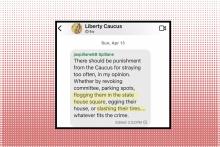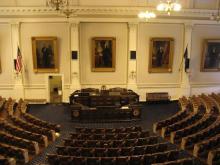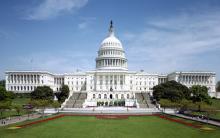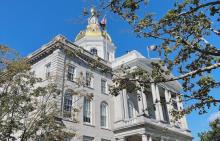Uh-oh. Apparently, some Republican legislators here neglected to take note of the recent Dept. of Defense Signal group chat where a journalist was “accidentally” included. And soon after that the personal lawyer, wife and brother of the current Secretary of Defense were included in another one. Accidentally? Who knows.
What price security, right?
On Thurs., April 10th, the House was voting on bills and amendments pertaining to the State Budget. The Democrats introduced a floor amendment to HB 2 titled “A Better Budget.” A few examples of what was in this proposed budget alternative:
~ Reverse funding cuts to mental health services, developmental disability support and family planning.
~ Remove voucher expansion to the wealthy, lift the local school budget cap, restore $50 million in university funding and protect Medicaid to schools.
~ Fully fund the Office of the Child Advocate, Human Rights Commission and Commission on Aging.
~ Eliminate the Medicaid income tax and tax on Children’s Health Insurance coverage.
Thankfully, there were a few wins that day for the people of NH, such as; a vote supporting an amendment to HB 2, removing the mandatory statewide school budget cap, 206-165. An amendment to restore the Bureau of Tax and Land Appeals passed by three votes, 183Y-180N. The bill increasing maximum benefits for first responders, HB 282, passed, 296Y-76N.
By mid-afternoon, a recess was requested by Republicans for their members to have a brief caucus. Seems like too many of their members were voting with the Democrats on some proposed legislation. Sure enough, barely an hour later we were all back in the chamber and the voting then went strictly according to party lines. No more wins for the people of NH.
On April 13th, there was a group chat on Signal. “There should be punishment from the Caucus for straying too often, in my opinion. Whether by revoking committee, parking spots, flogging them in the state house square, egging their house, or slashing their tires… whatever fits the crime,” wrote jaspillane68.
A Rep. James Spillane is from Deerfield.
The committee purge began soon after that threat.
Rep. Mark Pearson R-Hampstead, removed as Chairman for the House Child and Family Law Committee.
Rep. Arnold Davis R-Berlin, removed as vice chair of the Resources, Recreation and Development Committee.
Rep. Mike Bordes R-Laconia, wrote in a post on social media on May 6th: “Yet again today house ‘Leadership’ stripped committee chairs, vice chairs, and members who failed to be their puppets. Such totalitarian leadership behavior is a disgusting representation of what good leadership entails. The ‘do as I say or else’ mentality is ridiculous!!”
Also before all this recent purging, Rep. David Nagel R-Gilmanton, a doctor who served on the Health and Human Services committee, was removed by Republican leadership for refusing to vote for a bill eliminating the NH Vaccine Association, the state’s process for getting vaccines at discount.
Who are these Republicans in the House leadership?
The House Majority Leader is Rep. Jason Osborne. Auburn
The Deputy Majority Leader is Rep. Joe Sweeney. Salem
The Adviser to the Speaker is Rep. Katy Peternel. Wolfeboro
The Majority Senior Adviser is Rep. Jim Kofalt. Wilton
All are members of the extremist group Liberty Alliance.
By the way, there are laws against threatening public officials, even if you are one.










